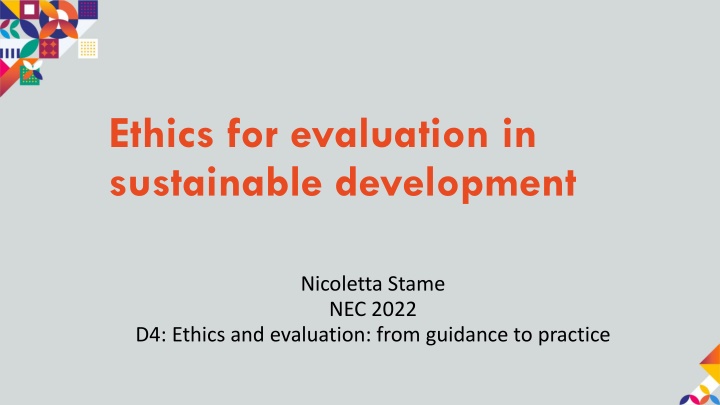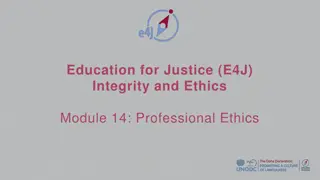Ethics and Evaluation in Sustainable Development
The presentation explores ethics in evaluation within sustainable development contexts, contrasting traditional views with newer perspectives emphasizing complexity, reflection, and stakeholder empowerment. It discusses ethical principles, areas of concern, and actions for evaluators to ensure ethical conduct and decision-making in evaluations.
Download Presentation

Please find below an Image/Link to download the presentation.
The content on the website is provided AS IS for your information and personal use only. It may not be sold, licensed, or shared on other websites without obtaining consent from the author.If you encounter any issues during the download, it is possible that the publisher has removed the file from their server.
You are allowed to download the files provided on this website for personal or commercial use, subject to the condition that they are used lawfully. All files are the property of their respective owners.
The content on the website is provided AS IS for your information and personal use only. It may not be sold, licensed, or shared on other websites without obtaining consent from the author.
E N D
Presentation Transcript
Ethics for evaluation in sustainable development Nicoletta Stame NEC 2022 D4: Ethics and evaluation: from guidance to practice
A traditional view of ethical guidelines Ethics as a norm of right behavior The program - Linearity, regularity, time bound - Isolated - Change as expected The evaluator - Expert - Value-neutral Ethics principle doing no harm, avoiding conflict of interest
New guidelines, old and new practice Guidance: Ethics as helping make good decisions in an uncertain world The program Complexity, uniqueness, conflict of values Long term, sustainability Change also happens in un-expected ways The evaluator Reflective practitioner Value critical Ethics principles New items: wrongdoing, interests and values, context, culture Doing no harm, preventing bad, doing good
A large area of evaluation Ethics for evaluator: ethical values concerning the professional conduct of the evaluator What it means to be a democratic professional who is concerned with the public good Ethics for evaluations: ethical values relevant for determining the acceptability and optimality of objectives and strategies What it means to act when alternatives are open to the various stakeholders (decision-makers, commissioners of evaluation, implementers, local agents)
Areas Areas of ethics in of ethics in evaluation evaluation Tackling bad Doing no harm Doing good Potential action: personal integrity in situations where the evaluation would be influenced Potential action: identifying "unintended impact" and including this in the evaluation Potential action: ensuring stakeholders are treated with respect and dignity Ethics for evaluator Potential action: considering "planned suffering" affecting the evaluand Potential action: considering "collateral damage", social & environmental safeguards, etc. Potential action: empowering the voice of stakeholders, acknowledging their social innovations Ethics for evaluations
Doing no harm Evaluator: identifying unintended impact" on evaluee privacy, tactfulness in asking questions, no exposure of wrongdoing Avoid conflict of interest Evaluation: considering collateral damage social & environmental safeguards >> Considering risks
Preventing bad Evaluator: personal integrity in situations where the evaluation would be influenced by vested interests Evaluation: Considering planned suffering affecting the evaluand identify and correct negative situations. Example: dams and resettlement: improve or at least restore livelihoods and living standards, in real terms, to pre-displacement levels ( ): no development >> Adverse un-intended consequences
Doing good Evaluator: treat stakeholders with respect and dignity Evaluation: How the evaluation can benefit society and the target population discovering and supporting positive and innovative solutions to serious problems empowering the voice of stakeholders acknowledging their social innovations: : sustain creativity >> Positive un-intended consequences























